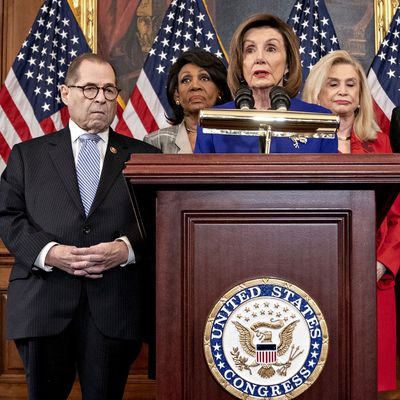
Donald Trump has been committing impeachable offenses since he took office. The president’s high-crimes spree has ranged from accepting undisclosed payments from interested parties to obstructing justice, undermining the law, and sundry abuses of power. Precisely why Democrats have decided to impeach him over these latest offenses is a matter of some controversy on two flanks. Progressive Democrats are agitating for a wider impeachment encompassing a broader, if far from complete, list of Trump abuses. Republicans insist Democrats are only launching impeachment now because the Mueller investigation ended anticlimactically, leaving the opposition panicked at a prospective Trump reelection.
The truth, however, is more anodyne. Democrats are impeaching Trump over the Ukraine scandal in large part because Republicans invited them to do just that.
When the Ukraine scandal burst into the news, a widespread consensus agreed that the allegations were deeply improper, and quite likely impeachable. “I think it would be wildly inappropriate for an American president to invite a foreign country’s leader to get engaged in an American presidential election. That strikes me as entirely inappropriate,” pronounced Republican Senator Pat Toomey of Pennsylvania. “If there is evidence of a quid pro quo, many think the dam will start to break on our side,” one Republican told the Washington Examiner in September. “Maybe if he withheld aid and there was a direct quid pro quo,” add another. Even a sycophant like Lindsey Graham conceded at the time that he might support impeachment “if you could show me that, you know, Trump actually was engaging in a quid pro quo, outside the phone call, that would be very disturbing.”
Even as the White House has withheld most documentary evidence and testimony from central figures like Mick Mulvaney, Rick Perry, Rudy Giuliani, and Trump himself, the case has been proved beyond any sliver of a doubt. Trump and his agents communicated to Ukraine through a variety of channels that they intended to trade a presidential meeting and military aid for the announcement of investigations into Trump’s domestic rivals. The terms of the deal are so obvious that even a fraction of the evidence was sufficient to establish it.
The primary effect of the proliferation of evidence upon the Republicans has been to persuade them to change their standards as to what is acceptable presidential conduct. Oklahoma representative Tom Cole said in September that the whistle-blower complaint is “a serious matter, and I will continue to thoughtfully consider information as it becomes available.” But Cole quickly decided that he was tired of considering information thoughtfully. “It doesn’t matter much anymore,” he said last month.
Many members of the mainstream media have defined this response as “partisanship.” A New York Times analysis noted that the parties in Monday’s hearings “presented radically competing versions of reality. CNN’s Chris Cillizza called the hearings “a bunch of adults yelling at one another over matters that almost no one watching understood or cares about.”
The reality is that the parties have, if anything, converged on a shared set of facts, at least as it pertains to the Ukraine scandal. Whereas Republicans previously refused to connect the dots that showed Trump’s Ukraine extortion, they have increasingly accepted reality. They have simply redefined the unacceptable as acceptable.
Ted Cruz, appearing on Meet the Press Sunday, denied that Trump had engaged in a high crime or misdemeanor, without denying the underlying conduct. “I believe any president, any Justice Department,” he insisted, “has the authority to investigate corruption.”
The U.S. government has procedures in place to ascertain whether recipients of foreign aid have taken adequate steps to police corruption, and Ukraine passed the test. Indeed, Ukraine’s government is in the midst of a sweeping reform era, which is precisely why Trump — whose allies are working to recorrupt it — greeted the new regime so suspiciously. The “authority” Cruz is defending is ad hoc power to call any political opponent “corrupt” and demand an investigation. If Trump wants to ask Cuba to investigate Rafael Cruz for taking payments to help cover up the murder of John F. Kennedy Jr., by Ted Cruz’s reckoning, he has every right to do so.
Trump’s attorney, Rudy Giuliani, has just completed another trip to Ukraine where he is continuing to promote a series of crooked and Russophillic characters and is openly telling the government it needs to give him his favored investigations if it wants Trump’s favor. Trump supported Giuliani’s work by endorsing his demands on the White House lawn.
Democrats have refrained from impeaching Trump to date because they concluded fatalistically that none of his conduct was sleazy or dangerous enough to drive Republicans out of his camp. They acted in response to his Ukraine scheme because Republicans explicitly signaled they had finally had enough. Instead they have reverted to form, meekly endorsing any abuse of power Trump commits. So they will maintain Trump in office, and he will commit more abuses of power.






























